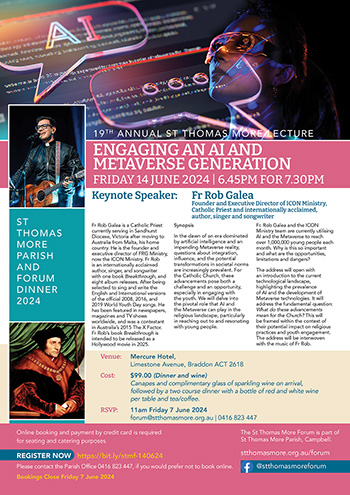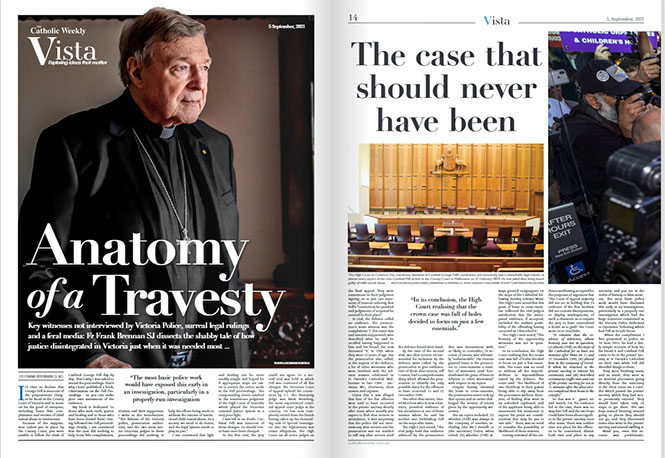Forum
Engaging an AI Generation
[Book Now]
Keynote Speaker: Fr Rob Galea
Founder FRG Ministry
Fr Rob Galea is a Catholic Priest currently serving in Sandhurst Diocese, Victoria after moving to Australia from Malta, his home country. He is the founder and executive director of FRG Ministry, a charity organisation that ministers to over 1.4 million people each year globally.
Fr Rob is an internationally acclaimed author, singer, and songwriter with one book (Breakthrough), and eight album releases. After being selected to sing and write the English and International versions of the official 2008, 2016, and 2019 World Youth Day songs, Fr Rob entered the realm of the cast of musicians having performed in some key events before an estimated single live audience of over 1 million people. He has been featured in newspapers, magazines and TV shows worldwide, and was a contestant in Australia’s 2015 The X Factor. Fr Rob’s book Breakthrough is intended to be released as a Hollywood movie in 2025.
Fr Rob has a significant evangelistic and outreach ministry as a speaker to students and teaching staff, as well as speaking and singing at conferences and churches globally.
Whilst greatly appreciating his gifts, he recognises that before everything he is a follower of Christ, a priest and only then, a speaker, musician and artist..
Date:
Friday 14 June 2024
Time:
6.45pm for 7.30pm
Mercure Hotel, Limestone Avenue, Braddon ACT 2618
$99.00 (Dinner and wine)
Canapes and complimentary glass of sparkling wine on arrival, followed by a two course dinner with a bottle of red and white wine per table and tea/coffee.
Online Bookings
https://bit.ly/stmf-140624
Previous Forums
Freedom of Religion - Developments
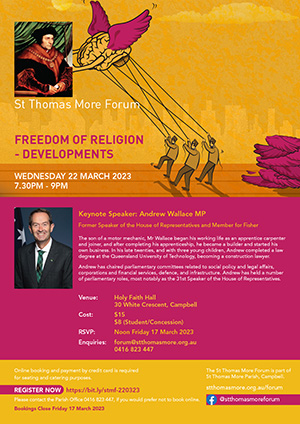 Thank you Bill and the St Thomas More Forum team for inviting me along to share tonight.
Thank you Bill and the St Thomas More Forum team for inviting me along to share tonight.
I’m honoured to be here in the parish whose namesake is that of another former Speaker of the House, albeit 500 years (in 1523) and 17,000 kilometres apart.
And of course St Thomas More was declared by Pope John Paul II in 2000 as the patron saint of statesmen and politicians.
Now I’m not sure if my good friend and flat-mate the Shadow Attorney-General and Shadow Minister for Indigenous Australians, Julian Leeser MP has in the Jewish faith a form of patron saint looking after him, but I’m very glad that St Thomas More has my back in Canberra. Would you please welcome Julian tonight, who has been sent here to make sure I don’t get myself into any trouble.
My Journey and Vocation
When I left school, I lived in a young Christian Community called Vaugirard and volunteered with the De La Salle Brothers, supporting marginalised young people who would have otherwise been living on the streets in Melbourne.
Believing that I was being called to a life of service to God and the Church, the following year I joined the Pallottine Order to become a Missionary Priest under the direction of Fr Walter Silvester. However after only having studied with the Pallottines for 8 months, Fr Walter came to the very quick realisation that it was doubtful that I was going to be able to fulfil my vows of poverty, chastity and obedience whereupon I was given the ‘DCM’ – the ‘don’t come Monday’.
That is a pretty special feat for a young man to be booted out of a monastery in the mid 1980s, when the Church was screaming out for young men to join the priesthood.
Whilst in the following years I agreed with that pretty sound assessment, some 36 years later as a former barrister with a successful commercial law practice, and now a Federal Member of Parliament who spends many months away from my wife and family, I am beginning to question the wisdom of Fr Walter’s discernment of not being able to fulfil those three vows after all.
After I left the Monastery, I became a carpenter and joiner, then a licensed builder, and eventually as I said a barrister practicing in commercial law. In 2016, I was elected the Federal Member for Fisher and have since worked hard to do my bit in making the world a better place, one day at a time.
Throughout my life, I have tried to remain true to the Latin motto of my old school St Bedes, where I was educated by the De La Salle Brothers: Per Vias Rectus, or “By Right Paths”.
In tackling issues such as eating disorder treatment, keeping kids safe online, reducing gambling harm, by holding big-tech, big-business, the banks and big-government to account on their role in preserving freedom and dignity, I have been compelled by the belief that walking the right path is often arduous, and lonely, but ultimately extraordinarily fulfilling.
Standing up for one’s convictions and beliefs sometimes lands us in trouble.
Sometimes, we feel like we walk alone in this journey of life. I often think of John the Baptist who remarked that he was a “lone voice in the wilderness, preparing the way for the Lord.”
There is no doubt that the strong faith that I grew up with, passed down to me from my parents and the De La Salle Brothers, has moulded me into the politician that I now am. You see, as strange as it might seem, I feel like I am back, albeit in a different guise, serving God and serving my community in what I regard to be the pinnacle of community service, in the Federal Parliament.
Yet it is not fashionable to talk of one’s faith any more. Once upon a time, the Labor Party was full of Catholics and proud to be so. The Liberal Party on the other hand used to attract more Protestants. But over the last 50 years, as the Australian community has become wealthier and more comfortable, our church numbers have declined.
It appears that many Australians either feel that God is no longer relevant in their lives, or many question His very existence. As is their right to do so. But equally, we people of faith have a right to practice our faith without fear of persecution.
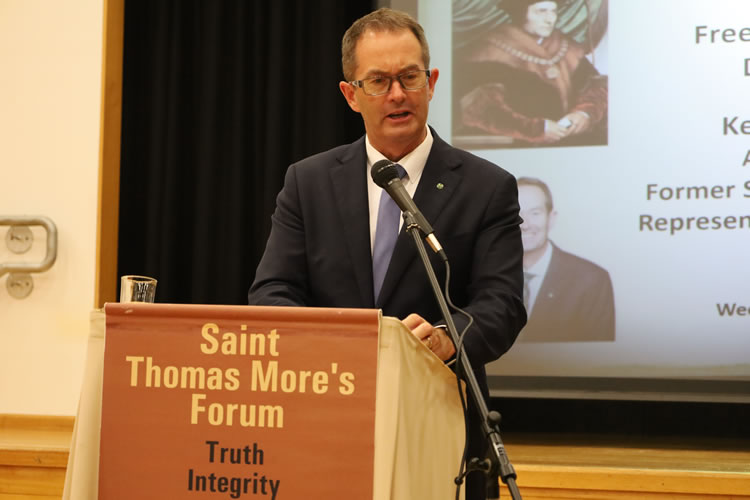 Why Religious Freedom is Important
Why Religious Freedom is Important
Freedom of religion or belief is a “precious asset” that Government, Church, and Society must be united in protecting and promoting.
It’s an asset which has appreciated over time into the liberal democracy we hold so dear.
It is “one of the foundations of a democratic society” as the European Court of Human Rights found in the Dimitras case.
It’s an “essential human freedom” as President Franklin D Roosevelt declared.
Article 18 of the International Covenant on Civil and Political Rights tells us that it is “far-reaching and profound” and that it is non-derogable and absolute.
It is a matter of fundamental human dignity.
As His Holiness Pope Francis shared,
“We believe that God created human beings equal in rights, duties and dignity, and he calls them to live as brothers and sisters and to spread the values of goodness, love and peace… there can be no peace without religious freedom.”
“Religious freedom is an authentic weapon of peace, with an historical and prophetic mission.”
“Religious freedom, an essential requirement of the dignity of every person, is a cornerstone of the structure of human rights.”
We cannot understate how crucial the freedom of religion or belief is to our national character, democratic order, and church teaching.
It is fundamental, precious and essential. And it is under threat.
Global Developments In Religious Freedom
Almost 1 in 3 countries face ongoing religious persecution, affecting 5.2 billion people – just under 2/3 of our population.
We know about some of these non-state actors who drive this persecution.
We think of ISIS and the Taliban, whose terror and transnational jihadist networks seek to establish “caliphates” at the expense of women, children, and those of differing beliefs.
As Deputy Chair of the Parliamentary Joint Committee on Intelligence and Security, I have fought to see these groups named, shamed, and held to account.
Groups like Hamas, ISIS, Jemaah Islamiyah, and most recently, the Islamic Revolutionary Guard Corps in Iran.
And more recently, the growing threat of right-wing extremists and white supremacists masquerading as Christian nationalists so tragically revealed in the murder of two police officers and one civilian on the Darling Downs in my home State of Queensland.
These groups, from across the political spectrum, employ online platforms to spread their radical ideas and to recruit domestic and international offenders.
Their insidious hatred of religious pluralism must be called out and stopped.
But intolerance is sometimes exacerbated or perpetrated by national governments.
Some of the worst are in our very own backyard, in the Indo-Pacific.
We know of China and North Korea, where Christians, Jews, Muslims and Falun practitioners face imprisonment, torture, labour camps, organ harvesting, sexual violence, and murder.
We know of Pakistan and Sri Lanka, where churches are subjected to mass casualty attacks with disturbing frequency.
At the 2022 International Ministerial Conference on Freedom of Religion or Belief, Australia joined over 30 democratic nations in committing to protecting this right, speaking out against violations of freedom, and to working together across borders and sectors to address challenges to freedom of religion.
That this issue hasn’t formed a more essential part of Australia’s foreign policy and human rights advocacy is, I think, a lost opportunity.
If we really want to be a force for moral good, regional security, and economic prosperity in our region, then promoting religious liberty ought to be a core human rights objective.
Domestic Developments In Religious Freedom
That also means that we do our bit to protect religious freedom here at home.
Pope Francis warned that the “radical secularity” which we see more and more in the West, risks consigning faith to the
“quiet obscurity of the individual’s conscience or relegates them to the enclosed precincts of churches, synagogues or mosques”.
Faith and religion, while not imposed or enforced by Government, should not be cause for discrimination.
Religion has a crucial role to play in society and in public life, as a moral compass for many and as a driver of civic duty and community-mindedness.
St Paul reminds us – and challenges us – that faith without deeds is dead. Faith without action is as good as having no faith at all.
General Comment 22 of the UN Human Rights Committee asserts that religious freedom must be protected – whether manifested behind closed doors or in community with others.
It should be encouraged by government, nourished by society, and a cause for celebration, not condemnation.
Religious Discrimination Legislation 2022
The previous Coalition Government sought to provide legally enshrined protections in a hard-fought and ultimately unsuccessful attempt at introducing religious discrimination legislation.
In November 2017, the previous Coalition Government appointed an Expert Panel, chaired by the Hon Philip Ruddock, to examine whether Australian law adequately protects the human right to freedom of religion.
That Panel concluded that there was an opportunity to further protect, and better promote the right to freedom of religion under Australian law and in the public sphere.
Its 20 recommendations formed the basis of the Coalition’s Religious Discrimination legislation, which was introduced in 2022.
What we sought was legislation that ensured Australians could not be discriminated against because of their religion – or lack thereof – as we went about our everyday lives.
As many of you know, that legislation went through an extensive consultation and review process.
It was opened for public consultation twice, submitted to a cross-party Parliamentary Committee review twice, and a survey conducted by the Human Rights Committee received over 48,000 submissions. 82% of those submissions were in support of the legislation.
I held two faith leaders’ roundtables in my own electorate to get a sense of how the Christian, Jewish, Muslim and Baha’i communities viewed the measures. They were of similar mind.
So, we brought it to a lengthy debate and vote in the House.
While some of the more eager political heads in the room tonight might have considered watching the entire debate, I’m sure most of you would have given up by midnight!
I was in the Speaker’s Chair for the deliberation, up until about 5.00am the next morning.
It was one of the longest debates in our Parliament for a generation.
However, the then Opposition moved an amendment to the Bill which would have stripped out protections for religious Australians expressing genuine statements of belief.
This would have weakened the Bill so much, that it would be more a statement of platitudes rather than statutory protections.
The Senate would have passed the amendment, despite its stall in the House.
For that reason, the Bill was withdrawn.
With emotions running high and parties not necessarily in-sync on these issues, it was not an unforeseeable outcome.
Antisemitism and Tolerance
But it’s not all-party politics and adversarial debate!
Just a couple of weeks ago, Parliament came together to reaffirm our commitment to the International Holocaust Remembrance Alliance’s working definition of antisemitism.
We stood united in calling out religious and racial hatred.
The idea of antisemitism is repugnant to our egalitarian way of life because it is an assault on who we are as Australian people.
This is the case for all forms of religious discrimination.
I say it again: faith should be a cause for celebration, not condemnation.
Religious Freedom In The Future
Looking forward, I’m keeping a close eye on a few issues.
I’m particularly concerned about the future of faith in our schools. I am particularly interested in protecting a school’s right to decide who should and who should not teach our children in accordance with their adherence to the school’s particular faith and precepts.
Australia has largely, to date, been able to deliver a secular education system which engages meaningfully with faith communities and issues of faith.
We have protection for religious instruction, faith-based chaplains, and community partnerships to deliver volunteer programs in state schools.
These are programs which are accountable to government, school administration, and parents.
They are not able to evangelise, proselytise or promote one church or another.
And they have stood us in good stead.
I have heard time and again from young people who, but for the intervention of their chaplains, would not be here today.
I have seen how local churches have helped parents feed, clothe, and support their kids to undertake extra-curricular activities.
But without appropriate protection, these initiatives are under threat.
Aid to the Church in Need, which I’m sure some of you here support, is an international Catholic pastoral aid organization supporting the persecuted Church.
They said in their 2021 ‘Religious Freedom In The World Report’ that,
“Even though governments recognise that teaching world religions in schools reduces radicalisation, and increases interreligious understanding among young people, a growing number of countries have discontinued religious education classes.”
We are seeing this happen in Queensland, with State Government Ministers and Members calling for the end of voluntary religious instruction.
I was recently holding a Listening Post in my electorate, in an area no longer typically considered a Coalition stronghold.
There, a grandmother approached me concerned about this issue. As many across my electorate have since.
They understand that religious instruction is not about making converts of our young people.
For 113 years in Queensland, religious and values instruction has taught young people the Judaeo-Christian ethic of community-mindedness, service above self, and by walking this journey of life, by right paths.
These are values which are deeply ingrained within Australia’s culture and our institutions.
They are the foundation of our liberal democracy and common decency.
And in a so-called, ‘post-truth’ world, where moral absolutes are few and far between, perhaps we could do with more, not less, education around how to be a decent person.
A Future Religious Discrimination Bill?
Having said all of this, you might find strange what I am about to say. That is, protection from religious discrimination may not necessarily require a whole new package of legislation.
We saw how torturous this issue became in the 46th Parliament. I had and still have real concerns about enshrining these religious freedom rights in legislation. By doing so, such legislation risks becoming a double-edged sword, in which the rights afforded to sensible groups like the Parish of St Thomas More would be afforded to dangerous fringe movements such as the Noosa Temple of Satan up in my neck of the woods. With every action, there is a reaction.
If we legislate for religious freedom, we ought to be very cognisant of unforeseen consequences.
Ultimately, the system we have, balancing common law and statute is generally working. Sure there are your Israel Folau moments, or similarly you would recall where Essendon Football Club CEO Andrew Thorburn was effectively forced to resign just one day into his contract because of the views expressed by his church pastor.
Whilst it is easy to suggest that the law is not doing enough to protect people in these situations, ultimately, Folau received a multi-million dollar settlement from Rugby Australia for his troubles (Folau reportedly received $4M) whilst the Essendon Football Club issued a humiliating apology for its actions and paid an undisclosed settlement figure to an ethics institute.
The law is not perfect, but it never is. There is no silver bullet.
Whilst I am not suggesting that I would never ever support a Religious Discrimination Bill before the Parliament, we have to look very carefully at the sort of unintended consequences that such a codification would bring.
We must nurture the tolerant, vibrant, and shared civic values of freedom, faith, and family which have stood us in good stead for nearly 2000 years of Christendom.
Closing Remarks
Just as a person’s faith is innate and essential and crucial to their being, so too is the protection of that faith, which is core to the function of democracy.
For thousands of years, great societies have been marked by the way they protect and nurture people of faith. In doing so, they have seen a precious asset appreciate into vibrant democracies.
For thousands of years, grave tyrannies have been marked by the way they persecute and oppress religious groups. In doing so, they have faced strife and ultimately come undone.
The protection of religious freedom requires valiant hearts and vigilant minds.
And by meeting this evening to discuss such an important topic, I’m heartened to see such hearts and minds ready to take on the cause.
As St Thomas More said,
“What part soever you take upon you, play that as well as you can and make the best of it.”
Photos: Luke Donnelly
https://www.stthomasmore.org.au/itemlist/category/2-forum#sigProIdf9fe16ef97
The Forum was launched 18th of July 2005 when we hosted our first speaker. As of April 2018, sixty-one Forums have been organized with eighty speakers having addressed these Forums.
The Forum is a pastoral endeavour of the St. Thomas More Parish and it operates as a committee of the Parish Council. There is strong support from the Archdiocese of Canberra and Goulburn. The then Archbishop of Canberra and Goulburn Francis Carroll was forwarded a letter of advice outlining the objectives and proposed direction for the Forum. Archbishop Carroll replied offering his congratulations and his positive encouragement. His successor, Archbishop Mark Coleridge was also an important speaker and contributor to the St. Thomas More Forum. The Archdiocese pastoral support agency Catholic Life supported the Forum in important ways including the ongoing development and management of our website, database and electronic communications strategies. Since late 2016, the Forum has been administered by the staff of St Thomas More Parish.
Speeches presented at the Forum appear on our website. The first book of speeches was published in December 2007, The St. Thomas More Forum Papers 2005 – 2007 contains the speeches from those Forums since inception. Our second book, The St. Thomas More Forum Papers 2008 – 2016 will be released in the near future.
There have been many highlights. one of which includes the presentation of the Annual St. Thomas More Lecture. There have been thirteen Annual Lectures, copies are available on this website.
Another highlight has been the revelation of the extent that faith does influence the private and the public lives of many of our speakers. Our audiences have often been inspired, encouraged and uplifted by the expression of these thoughts and views by our speakers.
In the future we plan to continue to cover a number of subject areas including the challenges facing those in public life, education, health, the media, adult faith formation and the work and family dilemma. We expect to continue to invite speakers from among the professions, academia, business, journalism, clergy, family based organizations and all sides of politics.
The Forums are conducted at the Holy Faith Hall next to the St. Thomas More Parish Church at 30 White Crescent, Campbell in Canberra.
Entry Fees
Adult
$15 per adult
Concession (school or university and concession card holders)
$8 per concession holder
Registrations:
Pre-event registrations and payments are encouraged for seating and catering purposes.
Please note that seating is only guaranteed for those who prepay for their tickets.
Payment at the door accepted.
To register for the forum:
If you wish to register and then pay at the door, please email the Parish Office at This email address is being protected from spambots. You need JavaScript enabled to view it. with your name and the number of attendees. Please note the alternative payment options:
Electronic Funds Transfer (EFT)
Account Name: St Thomas More Forum
Bank: CDF
BSB: 062786
Account Number: 000014869
Reference: Prior to transferring funds please write your full name in the description line.
{mosmap width='675'|height='350'|lat='-35.286642'|lon='149.156569'|zoom='18'|mapType='Satellite'|text='St Thomas More Parish'|tooltip='St Thomas More Parish'|marker='1'|align='center' }
Please click on thumbnail image below to view larger image.
https://www.stthomasmore.org.au/itemlist/category/2-forum#sigProIda559efda42
Please note the audio clips below are historical and recorded during or before 2012. Recordings after 2012 can be found on our Video page or Youtube Channel.
{music}/images/forum/audio{/music}
The St Thomas More Forum is part of St Thomas More Parish, Campbell. Please complete the form below to contact the committee.
Cardinal George Pell pleaded not guilty before a jury to child sexual assault charges in 2018. The public knew little of the proceedings because the trial judge had imposed a suppression order, prohibiting the media from publicising the evidence and court proceedings. Fr Frank Brennan SJ was asked by the Australian Catholic bishops to follow the proceedings and to offer commentary on the conduct of the proceedings once the suppression orders were lifted. The bishops asked that the commentary be seen, as far as possible, to be clear, objective and impartial.
After the initial conviction and then after the unanimous acquittal by the High Court of Australia, Fr Brennan spoke publicly about the proceedings. He has now published a book Observations on the Pell Proceedings. By correcting the gross failures in the Pell case, we might help to relieve the trauma of institutional child sexual abuse. Fr Brennan will propose lessons for both church and state in this year’s St Thomas More Oration. As a society we need to do better, and the legal system needs to play its part, as does the Church, if truth, justice and healing are to be a reality for complainants, victims, and anyone wrongly accused.
‘Whenever men or women heed the call of truth, their conscience then guides their actions reliably towards good. Precisely because of the witness which he bore, even at the price of his life, to the primacy of truth over power, Saint Thomas More is venerated as an imperishable example of moral integrity.’ Thomas More ‘distinguished himself by his constant fidelity to legitimate authority and institutions precisely in his intention to serve not power but the supreme ideal of justice.’ Thomas More ‘placed his own public activity at the service of the person, especially if that person was weak or poor;[and] he dealt with social controversies with a superb sense of fairness’. 1
Tonight I want to draw lessons from the Pell saga, heeding the call to truth, asserting the primacy of truth over power, working to enhance the place of legitimate authority and institutions which are to be administered not for the sake of power, but to seek the supreme ideal of justice, always having an eye for the one who is weak or poor, and attempting to deal with the most intense of social controversies with a sense of fairness.
- Download the Transcript:
pdf The Pell Case: Lessons for Church and State - Fr Frank Brennan OAM (2.70 MB)
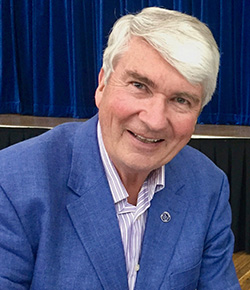 Fr Frank Brennan is a Distinguished Fellow of the PM Glynn Institute at Australian Catholic University and an Adjunct Professor at the Thomas More Law School at ACU. He is the author of numerous books on human rights having chaired the Australian Government’s 2009 National Human Rights Consultation and having been a member of the Australian Government’s 2018 Religious Freedom Review. Most recently he has served on the Australian Government’s Senior Advisory Group designing a proposed ‘Indigenous Voice’ for the First Nations Peoples in Australia.
Fr Frank Brennan is a Distinguished Fellow of the PM Glynn Institute at Australian Catholic University and an Adjunct Professor at the Thomas More Law School at ACU. He is the author of numerous books on human rights having chaired the Australian Government’s 2009 National Human Rights Consultation and having been a member of the Australian Government’s 2018 Religious Freedom Review. Most recently he has served on the Australian Government’s Senior Advisory Group designing a proposed ‘Indigenous Voice’ for the First Nations Peoples in Australia.
- Observations of the Pell Proceedings by Fr Frank Brennan SJ can be purchased directly through the publisher at www.connorcourtpublishing.com.au.
- Click here or the image below to read the The Catholic Weekly exclusive with Fr Frank Brennan
17th Annual St Thomas More Lecture and Dinner
24 June 2022
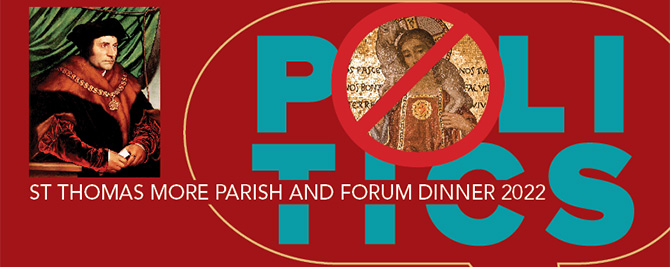
"Celebrating the feast of Thomas More, we are honoured that Australia’s celebrated journalist and commentator on contemporary affairs Paul Kelly will speak on Politics and Religion - The Growing Clash.
I am delighted to offer a brief reflection on Thomas More who was no stranger to such a clash."
- Fr Frank Brennan SJ AO
"It is a great pleasure for me to present the 17th St Thomas More Forum Lecture in 2022.
I want to salute this Forum for the role it places in religious and intellectual life. It is an honour and humbling to deliver a lecture with such a glittering list of former speakers. I want to acknowledge Father Frank Brennan who spoke last year on the campaign against Cardinal Pell and whose role in documenting this monumental injustice has been crucial.
The life of St Thomas More is linked to my theme tonight – the relationship between duty to the state and duty to God. More’s integrity and intelligence took him to the highest office, but his refusal to put the authority of the king before the authority of God brought his execution. His life reminds us that serving both state and God is an honourable task but there are occasions when a choice needs to be made."
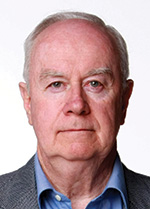 Paul Kelly is Editor-at-Large on The Australian. He was previously Editor-in-Chief and he writes on Australian politics, public policy and international affairs.
Paul Kelly is Editor-at-Large on The Australian. He was previously Editor-in-Chief and he writes on Australian politics, public policy and international affairs.
Paul has covered Australian governments from Gough Whitlam to Scott Morrison and is a regular television commentator on Sky News. He is the author of nine books including The Hawke Ascendancy, The End of Certainty and The March of Patriots. His most recent book, Triumph and Demise covered the Rudd-Gillard era.
Paul has been a Fellow at the Kennedy School of Government at Harvard University.
17th St Thomas More Forum Lecture and Dinner 2022
Click the thumbnail images below to enlarge and use the arrow keys to scroll.
https://www.stthomasmore.org.au/itemlist/category/2-forum#sigProIdfdf4b22f00
Mass Times
10 am Sunday
Every 1st and 3rd Friday @11.45am
please note there is no 5.30pm Mass
Mass at St Patrick's Braddon
2 Donaldson Street
Tuesday - Friday
12.30 pm
Confessions 12 noon Friday
Reconciliation
|
Campbell
Dickson
|
Sunday after Mass
Saturday 9:30 - 10:00am
|








